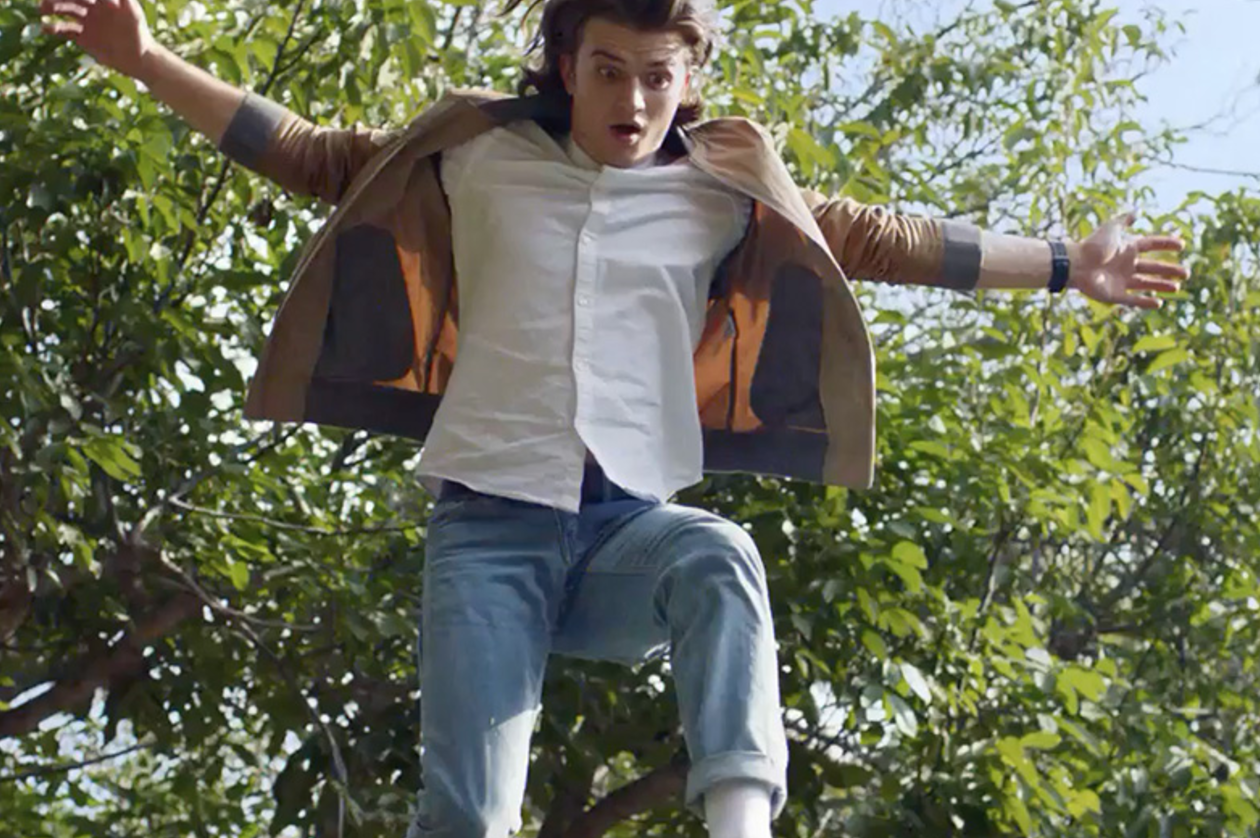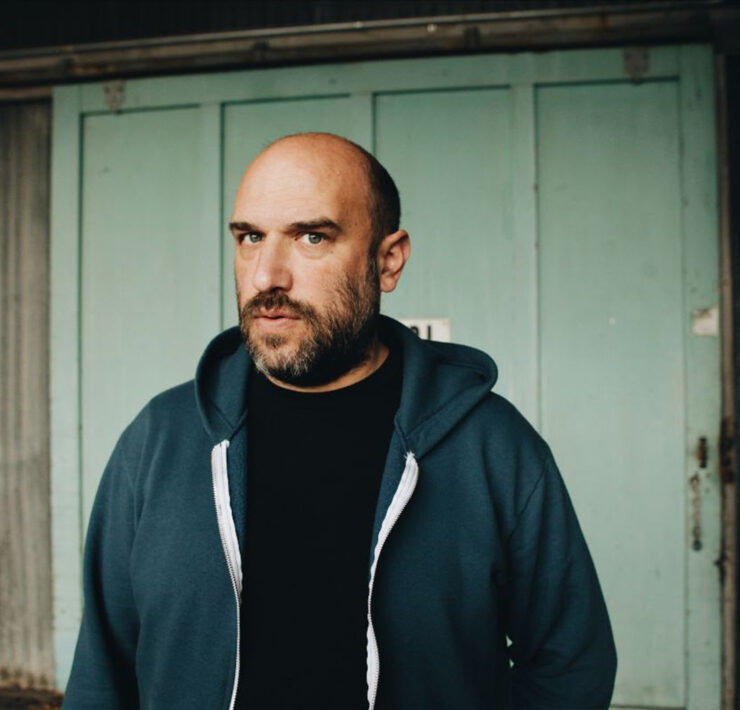
“I’m trying to keep my faiiith,” sang out the soulful, whisper-like vocals of The-Dream. The stage was lit with a fluorescent cocktail of purple and pink hues, and behind him stood a choir of about 20 people dressed in white, all with their heads bowed and hands out. That’s how Kanye West debuted his gospel epic “Ultralight Beam” on Saturday Night Live last year.
While The-Dream sang, West laid on the stage with his arms out. Close to the end of the song, a figure walked toward the rapper from stage left and began to boldly pray:
“Father, this prayer is for everyone that feels like giving up. This prayer is for everyone that feels like they are not good enough. For everybody that said ‘I’m sorry’ too many times. Jesus, I’m glad that’s why you came to give us eternal life. I’m so glad about it (faith). In this war, we were looking for (more), God please keep my little brother (safe), cause down here we’re fighting this (war).”
Kanye rose.
The praying man who seemingly resurrected West from the dead was none other than gospel music legend Kirk Franklin. An unexpected collaboration to say the least.
“I’m doing what I’m supposed to be doing,” he says, reflecting back on one of the most talked-about music performances of 2016. “I was really thankful for that opportunity.”
And that’s Franklin. He is a man who, despite his fame, friendships, talent and Grammys just wants to be a “light” in everyone’s life.
25 Years in the Making
Franklin’s music has always been unique in the gospel scene because, while his content is undeniably Jesus-focused, there’s always been an aspect of his production that’s bridged with the best mainstream sounds. It’s a blend that’s made him a mainstay in the music industry for years.
The magic in Franklin’s music comes in the mastery of his vision. Although he doesn’t really sing, rap or contribute heavily on instruments, he is a savant of arrangements.
 Like a conductor, Kirk doesn’t just hear the music—he sees it. He arranges the choir; he fluctuates through harmonies; he provides the giddy-up of a hype man to keep tempo. This flare for gospel music drama is what has led to double-platinum albums, and multiple Grammy, BET and Dove awards. Not to mention, collaborations with musical heavyweights such as Bono, R. Kelly and Mary J. Blige—and more recently, the likes of West, Pharrell Williams and Chance the Rapper.
Like a conductor, Kirk doesn’t just hear the music—he sees it. He arranges the choir; he fluctuates through harmonies; he provides the giddy-up of a hype man to keep tempo. This flare for gospel music drama is what has led to double-platinum albums, and multiple Grammy, BET and Dove awards. Not to mention, collaborations with musical heavyweights such as Bono, R. Kelly and Mary J. Blige—and more recently, the likes of West, Pharrell Williams and Chance the Rapper.
Now 25 years into his career, Franklin has seemingly assumed the role of a sort of a pastor to the current generation of rappers. But he doesn’t look at it like that. It’s not that he doesn’t accept the role, it’s just not what he’s trying to be, and he despises those who set out to be the “pastor of the stars.”
“I’ve always had a problem when I see people try to make it an agenda to be spiritual leaders to people who may have a visible platform. I think that’s insincerity,” Franklin says. “Something about that feels kind of like a wolf in sheep’s clothing. When people are intentional about ‘I’m going to be a saint to the stars or a pastor to the popular,’ there’s something about that that feels very gross. I never want to be that guy.”
Losing His Religion
Last year, Franklin dropped an introspective and personal album, Losing My Religion. The album title alone stoked flames of speculation.
In addition to the SNL appearance, he recorded a similar prayer on the album version of the song for West’s The Life of Pablo.
Franklin also made a cameo on Chance the Rapper’s Coloring Book on the song “Finish Line/Drown” and performed a set with him at Pitchfork Music Festival last year. When Big Sean debuted his own faith-inspired song “Sunday Morning Jetpack” in January, he name-dropped Franklin, bragging that working with him signified God’s blessing.
These moments met praise from the music world, but drew the ire from some Christians, uncomfortable with his collaborations with one of hip-hop’s more explicit artists—not to mention the whole “losing his religion” thing.
Franklin felt the sting during his joy.
“It definitely hurts,” he says. “I try very hard not to read [criticism], and try to remember the main agenda of what’s happening and going on. You try to be a good steward.”
 Being a “good steward” is how the gospel artist found himself in an unlikely friendship with the man who calls himself “Yeezus.”
Being a “good steward” is how the gospel artist found himself in an unlikely friendship with the man who calls himself “Yeezus.”
Franklin says he wants to be someone who is “available” to other artists. To West, that means being a “big brother” and “companion” who provides comfort, prayer or guidance, whether it be on the stage of 30 Rockefeller or at the Franklin household for a Thanksgiving dinner (yes, that happened).
“He’s a very kind young man, and we talked a long time about music and art. He told me at that time he really had the heart to have gospel in his music,” Franklin says. “I just wanted to try and build a friendship and be a brother he could call on and be there for him. You know it’s so hard for people to trust nowadays. I wanted him to see that I was someone who is more concerned about building a friendship than trying to gain anything else.”
In late 2015, West contacted Kirk about doing a song for his upcoming album.
“The original song had a sample of a track I wrote years ago and I thought, ‘You know this is a comfortable way to start,’” he says. “I heard it and thought this could be a cool moment. I wanted to try and find a way to do it.”
West wanted to work together on “many other occasions” previously, but Franklin’s response was “No, no, no, no” every time. Admittedly, Franklin wanted to avoid sending mixed messages to his fan base. But this time, he agreed.
“What type of brotherhood and friendship is that?” Franklin asks. “We have to build, and his love language is music. He allowed me to be exactly who I was; there was no compromising who I was. I was able to write for the song and write and produce what the choir is doing.
“It was amazing how many people [‘Ultralight Beam’] connected with.”
 Chance the Rapper
Chance the Rapper
Picture this: an up-and-coming rapper is renting a house in the Hollywood Hills while working on his new album. To get inspired, he wakes up every morning at 6 a.m., turns on a gospel record for two hours and puts the volume on full blast—with all the windows in the house open.
Everyone in the neighborhood hears blaring gospel music (and knows that this is his morning routine). The guy was Chance the Rapper, and the music he was blaring was Kirk Franklin’s.
In an interview with Zane Lowe on Beats 1, the young emcee revealed that Franklin is his “biggest inspiration” in making music. And it only takes one listen to his breakout mixtape, Coloring Book, to hear that influence.
Franklin puts it simply: “Chance knows my music more than I do.”
When someone told him Chance is a fan, Franklin wanted to meet up at the Austin, Texas, music festival, SXSW. The meeting never happened, but when Chance headlined the Pitchfork Music Festival in Chicago that summer, he personally invited Franklin to come out and perform with him.
After the two performed West’s “Ultralight Beam,” which Chance was also a collaborator on, he asked Franklin to jump on a track for his own upcoming album.
“Finish Line/Drown” is a two-part gospel song. The first half features T-Pain, then midway, the song switches over to “Drown” and piles on the gospel vibes with Franklin.
Franklin clearly has no qualms about laying down holy verses on the tracks of confidants, but he is less likely to have these famous friends on one of his records.
Part of it is the whole fear of sending “mixed messages” thing. But largely it also has to do with his desire for creating and maintaining genuine connection.
“I don’t know if they will be on a record,” he says, speaking of his high-profile friends. “For me, I am more focused on the relationship and being a light in people’s lives.
“I believe in what God is calling me to be. That’s all I want to be at this time. I don’t want to try and push it to something more than it is. I want to be accessible and available.”
Franklin isn’t sure if the high profile features gained him any new converts to his music, but that wasn’t the “divine goal.”
“We don’t know what the end of the story will be,” he says. “The amazing thing about life is that chapter is still being written now.”
The State of Gospel Music
Beyond these friendships, Franklin has high hopes for the current surge in interest in gospel music. That, he says, is part of his calling.
“People wanted to buy gospel music because they wanted to hear it,” he says. “There was a time when what we were saying and doing appeared to be interesting to people. Now, you have to beg people to know you’re in the room and what you have to say could be relevant to them.
“My fear is that we will lose our voice in the culture. There is still going to be gospel music in the Church, and there will still be hymns, but I’m talking about the message’s relevance in society.”
Franklin is straddling a divide that has existed for a long time. “Unfortunately, we’ve always had this premise in Christian culture that the world is bad, the world is wicked and anything that has to do with the world you stay away from,” Franklin says. “Now that we are moving into a season of biblical illiteracy, the world is everything in opposition to God. It’s a mindset, it’s a state of being.”

He thinks people who place themselves in this “isolated bubble” that shields them from the world have trouble connecting with those living away from God.
“You don’t know what the lingo is; you don’t know what the new clothing line is; you don’t know what the new sonic sounds in the studio are; you don’t know what the new beats are; you don’t know what the kids are saying these days; you don’t know what they are thinking because you say it’s ‘wicked,’” Franklin says. “You are no longer able to preach your gospel in a way that can survive in the 21st century.”
This is why the average Joe can grasp the gospel Kanye or Chance preaches, as imperfect as it is. Coloring Book paints a smattering of pictures that show someone who loves the Lord, but still falls short and has flaws. “Blessings,” “How Great” and “Finish Line/Drown” could sneak their way into any church service. The praise is genuine and the heart behind them is real.
Other tracks that talk about drugs, girls and a “worldly lifestyle” is what Christians tend to demonize about hip-hop. But being honest about those topics too, Franklin thinks, ultimately makes those artists more accessible for wider audiences—which exposes the listeners to the spiritual moments as well.
 The tension is what makes things so hard for Franklin. If he works with a secular artist, his gospel fans tell him he’s wrong. If he makes a song and doesn’t mention Jesus, he’s wrong. If he says a friend knows the Lord, but that friend is Kanye, he’s wrong. He’s not “Christian enough” for some believers and “too Christian” for non-believers.
The tension is what makes things so hard for Franklin. If he works with a secular artist, his gospel fans tell him he’s wrong. If he makes a song and doesn’t mention Jesus, he’s wrong. If he says a friend knows the Lord, but that friend is Kanye, he’s wrong. He’s not “Christian enough” for some believers and “too Christian” for non-believers.
It is understandably exhausting. And at this moment, Franklin is transparent about finding himself in a creative drought.
“I have no idea what I’m doing,” he says, a bit meekly. “I am so lost at what I’m doing next. I am so serious. I’m not even trying to figure it out. I’m just letting the Painter paint a picture, and I’m handing Him my crayons.”
It is new territory for Franklin. He has been hustling and grinding nonstop for 25 years and now has seemingly just given it up to God to lead.
“I hope in this season of giving God the crayons, I’ll be able to clearly see what picture I go into next. I’m totally OK with Him telling me the script and where to stand, what scene and what character He wants me to play. I’m cool with that.”








 Chance the Rapper
Chance the Rapper













